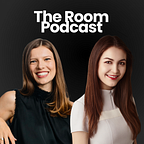In the Room with Christelle Rohaut
In this episode, we had the pleasure of sitting down with Christelle Rohaut, the Founder and CEO of Codi, a platform that is transforming the way we approach office space management. Codi simplifies the process of leasing office spaces by curating a personalized list of workspaces based on your preferences, assisting in scheduling tours, and handling logistics on your behalf.
Christelle grew up in Southern France and found her upbringing to be instrumental in inspiring her passion for urban planning. In her earlier years, she didn’t anticipate becoming a founder; her initial aspiration was to work in urban development. Christelle realized that everyday, we navigate our local neighborhoods, interact with people, and frequent local businesses. We often commute to work, only to return and once again immerse ourselves in our neighborhoods. This daily cycle is a fundamental part of everyone’s life. Christelle felt that by enhancing the design of our neighborhoods and making our daily routines more enjoyable and interconnected with the people and spaces around us, we could make people happier. This realization fueled her obsession with designing better cities and neighborhoods and led her to pursue a Masters in Urban Planning from UC Berkeley.
At Berkeley, Christelle was inspired by the culture of innovation around her and discovered that her passion for urban planning lay in finding solutions for underutilized spaces. She realized that during the day, residential spaces, in particular, homes, remained largely unoccupied, while people commuted to commercial areas. This inefficiency in transportation and space utilization inspired her to develop Codi.
The original concept for Codi was to connect workers with office spaces within residential homes. However, the company later pivoted towards serving enterprises, especially during the COVID-19 pandemic, when the home-based business model with lock-ins became impractical.
In this episode, we discuss three key themes: how work and workspaces have evolved over the past 5 years, the importance of innovation and adaptability in changing environments, and the future of commercial real estate.
Theme 1: How work and workspaces have evolved over the past 5 years
Christelle explains that in the era before Covid-19, traditional workspaces were typically located outside of one’s home. People would start their day by waking up, commuting to work, leaving their homes empty, and then, after the workday concluded, commuting back home in the evening. This conventional approach to work inspired Christelle to develop her thesis, centered on the idea of repurposing the underutilized space within homes, typically vacant during the day, into something more productive. This was the original concept behind Codi: to facilitate the transition of work and the workspace environment from offices to residential homes, thereby reducing wasted space, commuting time, and addressing environmental concerns.
However, the emergence of the Covid-19 pandemic completely altered the landscape of work and workspaces. Christelle’s thesis on working from home suddenly became the new norm as offices and the gathering of large groups of people in shared spaces became impractical. As we gradually transition to a post-Covid world, the impact of hybrid work and its influence still persists. Work culture now encompasses a combination of traditional workspaces and remote work options, with more and more organizations embracing the flexibility of remote work. This evolution reflects a significant shift in how and where work is conducted, embracing a more diverse and adaptable approach to the work environment.
Theme 2: the importance of innovation and adaptability in changing environments
Christelle had originally built Codi off of the idea that homes were underutilized pieces of real estate sitting empty all day. Christelle expresses that with the pandemic, “this utilization problem moved from residential to commercial and that was crazy to see.” However, it did not change Codi’s mission which is “always about leveraging and utilizing spaces and helping creators.”
In response to these changing environments, Christelle decided to pivot Codi’s focus towards converting commercial real estate into flexible workspaces. This move underscores the significance of adaptability and innovation when confronted with evolving circumstances in order to maintain product-market fit. In hindsight, the decision to target commercial real estate offered even greater business potential, given the advantages of collaborating with enterprises, as well as the numerous opportunities available in streamlining the process of searching and leasing office spaces. Christelle’s remarkable journey and her ability to adapt her thesis serve as an inspiring example for founders, showcasing how adaptability and innovation can be the driving forces behind success in a dynamic and ever-changing business landscape.
Theme 3: The future of commercial real estate.
Christelle shares her vision for the future of commercial real estate. She believes that there will be a limitation on the construction of new office buildings. She hopes that there will be a maximization of the utilization of existing spaces, as building more offices is not only environmentally detrimental but also seemingly unnecessary, given the existing vacancies and availability.
In addition, she envisions a new approach to leasing that aligns with the evolving concept of hybrid work. Rather than exclusive occupancy by a single company, Christelle advocates for a shared model, where multiple companies can utilize the same space on different days. This innovative structure reflects the future of physical workspace as a hybrid lease.
Finally, Christelle predicts that individuals will continue to work from home for a significant portion of their workweek, likely two or three days. It is essential for employers to recognize this trend and equip their employees with the necessary tools to be productive while working remotely.
Thank you for listening to this week’s episode of the The Room Podcast. We are so excited to see Codi continue to revolutionize work space management.
